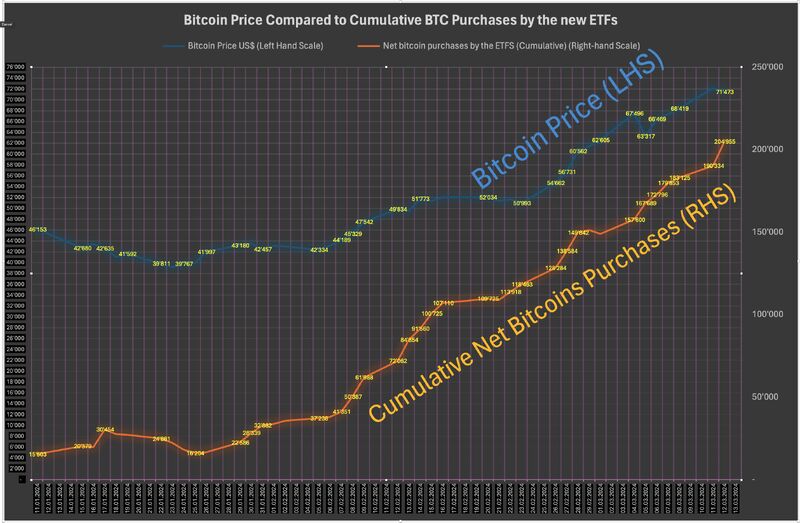Bitcoin Exchange-Traded Funds (ETFs) experienced a remarkable trading day on March 12, with a record-breaking purchase of 14,261 bitcoins.
The figure not only surpasses the initial enthusiasm witnessed during the ETFs’ launch but also sets a new high for market engagement. The method for calculating these Bitcoin purchases involves dividing the daily monetary inflow by Bitcoin’s average price, highlighting the ETFs’ significant role in the market.
After experiencing a downturn in inflows that coincided with a reduction in Bitcoin’s price, the ETFs have shown a strong rebound. Current trends indicate not just a recovery but an ongoing increase in investments. This surge in demand for Bitcoin through ETFs, contrasted with the daily new supply from mining at approximately 900 bitcoins, is contributing to an upward movement in Bitcoin prices. This gap is expected to expand with the upcoming Bitcoin halving event, which will reduce the daily mining output to 450 bitcoins.

In a March 14 post on LinkedIn, Clive Thompson, a former managing director of wealth management with a background in Swiss Private Banking, noted a potential link between the increase in Bitcoin holdings by ETFs and the rise in the cryptocurrency’s price.
This suggests that ETF activities could play a crucial role in Bitcoin’s market movements. Despite price fluctuations, Bitcoin’s overall trend remains positive, supported by a high Cryptocurrency Fear and Greed Index at 91, indicating a strong market sentiment.
The market is currently driven by two main factors: the anticipation of the Bitcoin halving event, which is predicted to initiate the next bull cycle, and the continuous interest in ETFs. The introduction of Bitcoin ETFs has been particularly significant, attracting institutional investment and increasing the cryptocurrency’s mainstream appeal.
According to Kaiko Research, liquidity depth in the Bitcoin market has hit a new high, with a notable imbalance between bids and asks in order books, suggesting a trend of profit-taking among traders. Despite this, high refinancing rates indicate sustained demand for Bitcoin.
The rising interest in spot Bitcoin ETFs, both from institutional and retail investors, is making a noticeable impact. With Bitcoin ETFs nearing $60 billion in assets under management (AUM) and rapidly closing the gap with Gold ETFs, which stand at about $98 billion, the momentum suggests a potential shift in investment preferences.
Eric Balchunas from Bloomberg Intelligence points out that all 10 Bitcoin ETFs are likely to surpass Gold ETFs in AUM. The least ranked among them, WisdomTree‘s BTCW, already manages $74 million, placing it in the top 15% of the 108 ETFs launched in 2024, signaling a strong market acceptance and growth potential for Bitcoin ETFs.
This article first appeared at crypto.news

